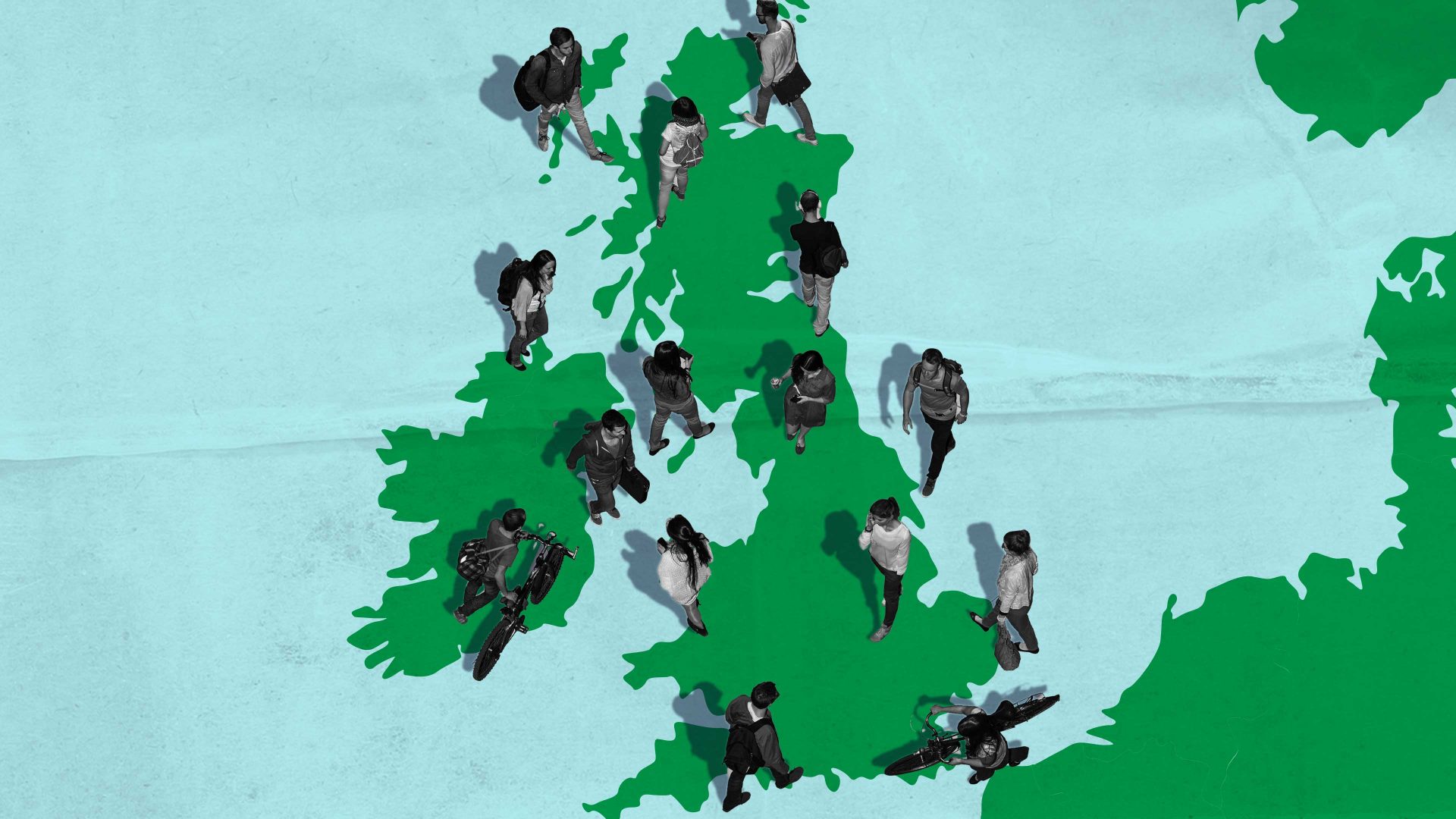Perhaps the most consequential political gaffe of the 21st century – at least until Rishi Sunak skipped the D-day commemorations – was Liam Byrne’s decision to write a witty remark on public finances in the traditionally unpublished note to his successor as chief secretary to the Treasury in the 2010 election.
“I’m afraid there is no money” had been intended as a wry remark on global public finances after the bailouts needed to avoid the collapse of the financial system following the 2008 crisis, but was cynically exploited by the Liberal Democrats (though it only benefitted the Conservatives) to suggest Labour had recklessly spent all the UK’s money.
Fourteen years later, any new government would look on that 2010 balance sheet with envy. It is much worse, debt is much higher, and economic growth has all but stalled. There is unlikely to be much new money for exciting projects any time soon.
That can result in something of a counsel of despair, as if a new Labour government might just deliver the same results as the Tories – things can’t get any better this time. To try to counter that view, the New European contacted experts in a range of different policy areas and asked them for a few ideas that a new government could try.
Crucially, these needed to be relatively easy and quick to implement, and not cost too much – these aren’t the huge ideas that would change a nation. Instead, it is a set of practical proposals in different fields that might make the country a little bit better without blowing the public purse.
Here, then, are 15 good ideas that any new government should steal.
1
Matthew d’Ancona
EDITOR-AT-LARGE, TNE
Keir Starmer should announce a warp-speed overhaul of standards in public life: root-and-branch reform of the Electoral Commission to drive foreign money from UK democracy and to confront the impact of digital technology on elections; the appointment of an independent national commissioner for ethics and standards, accountable to parliament; the harmonisation of the Commons Code of Conduct, the Lords rules, the Behaviour Code and the Ministerial Code into a single parliamentary code, on a statutory basis; and tougher sanctions for ministers who knowingly mislead parliament and refuse to correct the record. Cost to the taxpayer: minimal.
2
Patience Wheatcroft
CROSSBENCH PEER
Pension funds should be made to invest a proportion of their income in the UK. Infrastructure projects are ideal as the funds need to ensure long-term returns. Housing for rent is an obvious fit. Nurseries and social care homes, which benefit from site-sharing, could be good long-term investments without looking for the greedy level of returns that private equity has demanded. Toll roads are inevitable, and at least they should be pot-hole free; pension funds could be the providers. And the pension fund contributors would benefit from the projects and the resulting income.
3
Jimmy Wales
Founder, Wikipedia
To ensure transparency and protect the community of volunteer editors, it is imperative for legislation and regulatory frameworks to undergo a “Wikipedia test”. If a law or regulation renders Wikipedia inoperable, poses a threat of doxxing or authoritarian government surveillance to our global community of editors, or restricts the ability of ordinary individuals to edit Wikipedia across borders without fear of legal repercussions or retaliation from influential figures who dislike the reliably sourced information about them on Wikipedia, then such legislation or regulation not only hampers other online activities in the public interest, but should also be reconsidered or discarded.
4
Hannah Aldridge
Senior Policy and Research Officer, Child Poverty Action Group
The first thing the new government should do to reduce the record number of children growing up in poverty in the UK is abolish the two-child limit. This tax on siblings caps the amount of support provided to lower-income families and causes additional hardship for 1.8 million children. Costing £1.8bn, ending the two-child limit is the most cost-effective way of reducing child poverty per pound spent.
5
Helen Barnard
Director of policy, research and impact, The Trussell Trust
Universal Credit’s failure to protect people from going without essentials is the single biggest driver of rising destitution and food bank need. Half of those receiving it don’t even get the full (inadequate) amount because money is deducted to pay debts, mainly to government itself. That drives appalling levels of hunger, hardship and other debt. Introducing a protected minimum level into the system at 15% below Universal Credit’s current level would immediately limit the impact of unaffordable debt deductions and the benefit cap. It could be done very quickly, without legislation, and would cost no more than £200m.
6
Jamie Klingler
CO-FOUNDER, #RECLAIMTHESTREETS
Mandatory training for everyone in the judicial and family court system to undergo training on domestic violence, covering physical abuse to coercive control – so that victim-survivors have more of a chance to protect themselves and their children. Once domestic abuse has been found as fact in the court, perpetrators must undergo Domestic Abuse Perpetrator Programmes to start to gain awareness of the impact of their actions, to do work on themselves and to be held accountable. This will support one in three families and save a lot of money in the DA sector in the long run.
7
The Secret Barrister
The criminal justice system is in chaos. Years of chronic underfunding have created a record court backlog and overflowing prisons. The number of defendants pleading guilty is decreasing, as they realise they can hold out for years waiting for a trial, with a likelihood that victims and witnesses will give up.
The long-term solution? Funding. A short-term patch? Increase the availability of suspended prison sentences. Presently only custodial sentences of up to two years can be suspended. Increase it to three years, and a whole swathe of non-violent offenders who currently would not qualify – such as low-level Class A street dealers – would become eligible. This would incentivise the guilty to plead guilty, while relieving the strain on the prison system.
8
Jill Rutter
UK in a Changing Europe and the Institute for Government
A very simple change a new government could make on day one would be to change the rules to allow school groups from any EEA country to come here using national identity cards, and waive visas for any member of the group who would normally need one. The Conservative government imposed the requirement for passports and visas after Brexit – collapsing the number of trips – but agreed a change for school students in France only last December. Pluses: helps UK school visits business, which was badly hit by Brexit; signals a new positive attitude to EU. Minuses: none.
The government should dramatically cut the number and scale of competitive funds that local authorities have to apply for, and put the savings into general grant. Where funds are applied for, local authorities should have at least two financial years to spend the money. Government should publish in full all allocation criteria to prevent any sense of political favouritism, and those should be audited by the National Audit Office.
The government should commit to reforming council tax. First, it should add a series of higher bands for high-value properties to reflect how out-of-date 1992 values are (Wales has done this, but the UK government has not in England). It should also – over the next parliament – commit to making the bands more proportional to values. It should look at updating the band allocated to a property when the property changes hands.
9
Tom Forth
CO-FOUNDER AND CHIEF TECHNOLOGY OFFICER, THE DATA CITY
“Read my lips: no new taxes”, promised George HW Bush in 1988. Rachel Reeves is saying much the same. That’s why a Workplace Parking Levy is such a good way to fix public transport in Britain’s big cities: it’s not a new tax. This year Nottingham will charge businesses £550 for every car parking space they make available to employees. They alone have been doing it since 2012. As a result, Nottingham has new tramlines and better buses than cities two or three times its size. Traffic congestion is down, the air is cleaner, businesses are unaffected. Edinburgh recently chickened out of doing the same, but there’s no reason why other cities looking to invest in better public transport couldn’t be more like Nottingham.
10
Sunder Katwala
DIRECTOR, BRITISH FUTURE
Labour wants immigration to come down from exceptional levels of over 600,000 a year – but without saying what its preferred level would be. Yet it is hard to pick a number for five years’ time without a crystal ball about the economy at home or geopolitics abroad. So immigration targets have been little more than soundbites and broken promises. The sensible alternative is more democratic accountability: an annual budget-style immigration report, reviewing flows and impacts, with an annual parliamentary vote on the next year’s plans. Debating the trade-offs could show how immigration could be a more normal policy issue, not always an existential one.
11
Rozina Breen
EDITOR-IN-CHIEF AND CEO, THE BUREAU OF INVESTIGATIVE JOURNALISM
Local journalism is not only vital to a transparent and functioning democracy, it has the power to support the regeneration of the UK’s towns and cities, contribute to skills and sector growth – and crucially offers the space for deep and much-needed civic engagement.
The economic implosion of some local newsrooms in a context of the tsunami of mis- and dis-information, increasing distrust in public institutions, and weaponisation of journalism by people in power offers a compelling context for change and government support.
I would love to see a conversation re-ignited around the Cairncross Review (established in March 2018 to consider the sustainability of high-quality journalism in the UK) and for the recommendations of that review, including direct funding for local public-interest news, to inform policy that drives pluralism and much-needed sustainability in our industry.
12
Laura McInerney
FOUNDER OF TEACHER TAPP AND FORMER EDITOR OF SCHOOLS WEEK
A simple one in schools would be slightly reducing content in the national curriculum. The last government jammed several things in and so we’ve ended up with an overly-full primary curriculum, including teaching very detailed grammar rules and Roman numerals in maths. At secondary, there’s a particular desire to reduce content in science and history GCSEs.
A quick expert review could recommend such changes, and documents can be amended overnight. Exams at both levels might take longer to adapt, but it would start the process.
13
James O’Malley
POSTCODE CAMPAIGNER
The Postcode Address File (PAF) is a big database of every UK postal address. Not personal data – literally just every building. If it were to be released as open data, small businesses and bedroom coders could build new apps and services that take advantage of address data – this is one of the reasons why there’s no app that can tell you which bins to take out, and why address databases on online forms are always woefully out of date.
Sadly at the moment it is owned privately by Royal Mail, which charges steep licensing fees for apps wanting to use it (upwards of £6,000). The next government should liberate the PAF – and use it to boost productivity and growth!
14
Sam Goodman
CO-CHAIR, THE NEW DIPLOMACY PROJECT
Given the controversy and cost of the Home Office’s depletion of overseas aid funds on housing refugees, an incoming government should introduce a bespoke minister for migration sitting across the Foreign Office (FCDO) and Home Office and reporting directly to the development minister.
This would have the impact of immediately bringing the Home Office’s aid spend under control, of increased transparency, and would ensure it is integrated with a wider strategy to respond to conflict and climate migration. It might also serve as an opportunity to bolster the number of development ministers in the FCDO, something that the sector has long called for.
15
Felix Simon
RESEARCH FELLOW IN AI AND NEWS, REUTERS INSTITUTE
Even in times of empty coffers and low hunger for new public spending, there are still plenty of options for an incoming government to improve the UK’s media environment.
On the inexpensive end: improving responsiveness to freedom of information requests and addressing strategic lawsuits against public participation (SLAPPs) – both of which are making journalists’ lives harder. In addition, the government could follow the House of Lords recommendations to take action on the flouting of copyright rules when it comes to the training of AI models, and update legislation where necessary.
On the more expensive end, a new government could invest in (local) public-interest news outlets and adequately funding public service media like the BBC, whose budget has been cut 30% in real terms since 2010.




